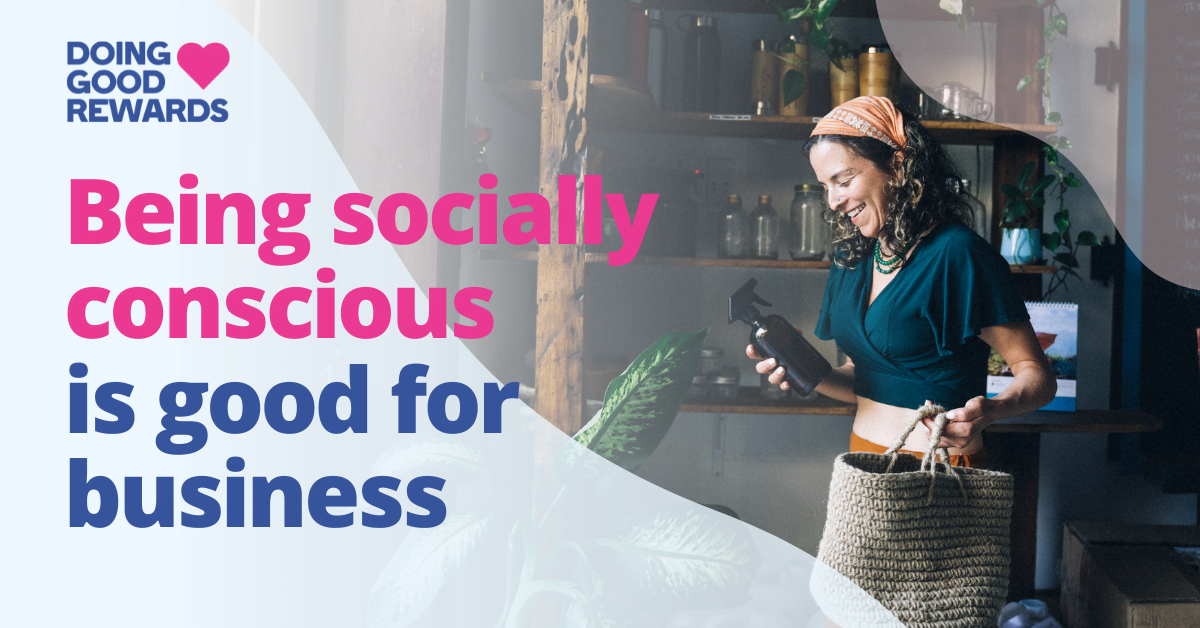
Being socially conscious is good for business
If you’ve been operating a business over the past couple of years, nobody needs to tell you that the landscape is more challenging than ever.
While operational issues will come and go (and let’s hope some of them go quickly!), what remains at the core of every business is the customer. It always boils down to how good you are at giving customers what they want.
As more customers become more overtly socially conscious, among the things they want is to know our values, how we source our products, how we treat our staff, whether we support charities, how we’re managing our carbon footprint, and the like.
Some may be doing that on a transaction-by-transaction basis, but it’s far more likely that a customer is looking for a business – be that a local retailer, a mid-size multiple-outlet chain, or a multi-national corporation – that they’ll be comfortable partnering with for the long term.
In other words, if your commitment to social, environmental, or ethical issues aligns with theirs, they’re prepared to be a loyal customer. And, potentially, a brand advocate, which is even better for your business.
It’s not a passing fad
Corporate Social Responsibility is by no means a new thing, but it has certainly gained a lot more traction over recent years. Increased general awareness of issues such as poverty, homelessness, food insecurity, pollution and, of course, climate change, has led more consumers to think about the impact of their purchasing decisions.
Ten years ago, a Forbes article noted: “While corporations that are seen to be “responsible” benefit in many ways including improving reputation, attracting employees, and increasing market share, the real value goes to corporations that understand their social purpose and profit from making social change.”
Even longer ago, Richard Branson was setting a good example when he established Virgin Mobile in America. He built in a mission to tackle homelessness through RE*Generation USA, thereby giving Virgin Mobile’s millions of customers an opportunity to play a role in reducing the number of homeless youth.
So, more than a decade ago, some businesses were already recognising that social change was good for business. Of course, they primarily wanted to do good because it was the right thing to do, but there was no denying that it was also part of the competitive equation.
Let them know you care
Look at it this way: the ‘average’ consumer making an everyday purchasing decision is considering a number of factors, not least price, but also things like convenience, brand recognition, quality, reputation, and customer service.
What if your reputation as a caring business, one that has a clear and meaningful position on social issues, preceded you?
What if there was a strong goodwill factor encouraging the consumer to look at you favourably even before he or she considered the rest of the ‘equation’ behind what would otherwise be a straightforward commercial transaction?
For example, if two cafes were otherwise fairly similar, but one was still using polystyrene cups and plastic straws while the other offered biodegradable plant-based straws and reusable cups, there’s a pretty good chance that any customer aware of that difference wouldn’t even get as far as comparing menus and prices.
Charity is a strong driver of reputation and loyalty
Even before we watched communities devastated by bushfires and floods, a number of studies had found that most Australians support charitable giving.
Whenever possible (and prompted), we reach into our pockets. For the Royal Children’s Hospital Good Friday Appeal, to help save the habitat of koalas, to contribute to clean water for children in Africa, or for flood or drought relief.
If it’s not a monetary donation, it might be food, clothing, even furniture for those in need. It might be a couple of toys under the K-mart Wishing Tree at Christmas, to put a smile on the face of a child we’ll never meet.
It’s certainly something that most people appreciate and connect with, which means that any business that is known to include charitable giving on its balance sheet is readily seen as a fellow traveller.
And, given the increasing social awareness of millennials and Gen Z, you can be sure that they’re making their purchasing and loyalty decisions on that basis.
Find out how to make your customers’ experience truly rewarding at https://bit.ly/3wUF2JW
Recent Posts
- 4 Tips For Communicating Your Social Impact
- Changemaker Consumers: 2023 Trends All Brands Need to Know
- Put your holiday spending to great use this holiday season!
- Stop just giving money to charity and go ‘full CSR’ with purpose
- The right way to promote and profit from your Corporate Social Responsibility credentials
Categories
Click here to email us & we’ll contact you to send more info
Click here to book a 15 min Zoom meeting to find out more
What would you like to do?

Stay ahead of the trends and the competition
Download Free PDF

